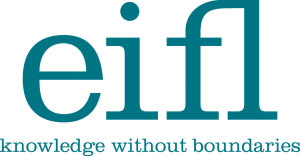 [Electronic Information for Libraries, Link, (CC-BY)] Only between 1-7% of books worldwide are published in formats accessible to blind people such as Braille, large print, audio, DAISY Inaugural meeting of Ghana stakeholder group, Accra. Credit: Judy Friend (Digital Accessible Information System). The aim of the Marrakesh Treaty, that creates an international legal framework to enable the cross-border sharing of accessible materials, is to alleviate the “book famine” for people who are blind, visually impaired or otherwise print disabled. Adopted in 2013 by Member States of the World Intellectual Property Organization (WIPO), Ghana was in the first group of countries to show political support by signing the Treaty.
[Electronic Information for Libraries, Link, (CC-BY)] Only between 1-7% of books worldwide are published in formats accessible to blind people such as Braille, large print, audio, DAISY Inaugural meeting of Ghana stakeholder group, Accra. Credit: Judy Friend (Digital Accessible Information System). The aim of the Marrakesh Treaty, that creates an international legal framework to enable the cross-border sharing of accessible materials, is to alleviate the “book famine” for people who are blind, visually impaired or otherwise print disabled. Adopted in 2013 by Member States of the World Intellectual Property Organization (WIPO), Ghana was in the first group of countries to show political support by signing the Treaty.
Roadmap for ratification
In order for the Treaty to come into force, it must be ratified by at least twenty countries. Ghana has once again got off to an early start with a meeting of stakeholders that set out a roadmap towards ratification of the Treaty in Ghana. The meeting, that took place in Accra on 16 January 2014, was coordinated by Dr. Peter Obeng, Director of the Ghana Blind Union (GBU) and chaired by Madam Yaa Attafua, Acting Copyright Administrator at the Ministry of Justice. Valentina Bannerman, Left to right: Chris Friend (WBU), Dr. Peter Obeng (GBU), Madam Yaa Attafua, Acting Copyright Administrator, Julius Akuoko (GNAD), Valentina Bannerman (CARLIGH)retired University Librarian represented EIFL partner, the Consortium of Academic and Research Libraries in Ghana (CARLIGH) as the EIFL-IP coordinator. Other stakeholders present included the World Blind Union (WBU), Ghana Federation of the Disabled, Ghana National Association of the Deaf (GNAD), Ghana Library Authority, Members of Parliament, authors, and journalists.
A committee to oversee the ratification process will be formed to make recommendations for implementation into national law. A national workshop will take place and special sessions will be held with publishers and members of the Parliamentary Committee on Legal Matters.
From book famine to book banquet
“Librarians are acutely aware of the shortage of reading materials for our blind and visually impaired library users”, said Mrs Bannerman. “At the University of Education, Winneba Library for instance, one student has to be accompanied by a person whose task it is to read to them. Imagine the frustration in looking for a helper who will comprehend the passage being read or grasp the nature of the information needed. Ghana must ratify the Treaty urgently to help libraries facilitate greater access to information to all our library patrons”.
For Chris Friend (WBU), ratification will take Ghana from a country of “book famine” to a nation of “book banquet” to benefit everyone with a print disability. EIFL is pleased to be working closely with WBU to help make this a reality in EIFL partner countries. For now, Ghana has got off to a good start.
Blind Union urges government to ratify published works treaty.




